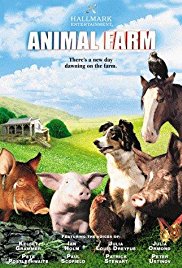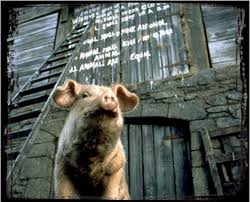Before 1991 the Communist ideology and the Soviet Union were considered major threats to the Western democracies. Billions of dollars were spent in what is generally known as “The Cold War” to both defeat communism and to establish capitalism as the dominating economic force in the world. Skirmishes erupted into actual warfare in this intense competition between the two systems of governing, most notably in Korea and Vietnam, and threatened nuclear confrontation in Cuba. But, in the end, the Soviet Union collapsed under the weight of its own inefficiency and its endemic corruption. In Animal Farm, Orwell demonstrates the pattern of corruption seen in many well-intended revolutions around the world that eventually led to the demise of the Russian Communist system.
Communist social philosophy was developed by Karl Marx and Friedrich Engels in the 19th century in response to the vast inequities of industrialization and the excesses of capitalism. Working conditions were terrible; factory workers were paid little, and their lives were harsh; many factory owners amassed great wealth and lived like kings. Communism became a potent worldwide force in 1917 when adherents to its theories, the Bolsheviks, took power in Russia and created the Soviet Union.
In brief, communism is an economic and political system in which all of the factories, farms, real estate and other means of economic production are owned and controlled by the community for the benefit of all. Each person is supposed to work according to his or her ability and to receive benefits from society according to his or her needs. Theoretically, in the ultimate stages of the development of society, government would become unnecessary as the community would govern itself. In reality, however, communism has been associated with dictatorial regimes that suppress individualism and civil liberties while concentrating power in the hands of authority, all at great cost to the masses of people.
Question 1: How would people have to behave for a society with no government to work?
Since the collapse of the Soviet Union in 1991, Communism has been abandoned by most governments and is no longer considered a threat to the Western democracies. China remains a communist country in name only, but capitalism reigns in its economy, and the country operates freely within the system of international capitalism. China is beginning to develop a strong middle class and allow its people to express their individuality is some ways. However, it is an open question of whether China will go so far as to allow Western style civil liberties.
Communism is in direct contrast in terms of values and mode of operation to capitalism, the economic system used by most of the world’s democracies. Capitalism is a system in which the means of production and distribution are privately owned and are managed for profit. The exchange of goods and services takes place through a free market system governed by supply and demand. The United States and most countries in the World have modified capitalism by imposing government regulation on the production of goods and services and on the markets when necessary to ensure the public welfare. Examples of these regulations are the wage and hour laws, health and safety codes, antitrust laws, and product liability law suits.
Socialism is an economic system, used to some degree by democracies, in which the most important means of production, as well as the means of distribution of goods and services, are owned by the state and managed for the welfare of society as a whole. In a socialist state, for example, the natural resources, factories, large farms, the banking system, and the markets would be owned and operated by the state. Socialism, like communism, was caused in part by a reaction to the vast inequalities of wealth that existed in capitalist Europe during the 18th and 19th centuries. Some aspects of the socialist system have been, to varying degrees, adopted in Europe and the United States to protect people from the excesses of capitalism. In the U.S., these include welfare which provides income assistance for the destitute; national retirement plans such as Social Security; medical care (limited to the poor and the elderly in the U.S. but provided for all members of society in most democracies); unemployment insurance; the U.S. Postal Service; the public school system; municipal electric power companies, and other special agencies such as the Tennessee Valley Authority and stores in some states that sell liquor.
Question 2: What would your life be like without a public school system?
The consensus in the United States and western democracies is that the most efficient form of economic organization is a modified capitalism in which most of the means of production and distribution are privately owned but are also subject to government regulation to keep markets free, prevent abuses, and ensure public safety. A safety net is provided to redistribute wealth to those unable to provide for themselves, such as the poor, the handicapped, and the elderly.
In Animal Farm, George Orwell, a British writer who considered himself a democratic socialist, uses allegory to express his deep disdain for the corruption of the leaders of the Soviet Union, most notably Joseph Stalin, and promulgates the belief that it is this corruption that destroys revolutions rather than what may be the fundamentals of the revolution itself. Animal Farm was published in 1945 and addresses the period prior to World War II in the Soviet Union. It mirrors specific events in the years when Stalin, considered my most historians to be a brutal and ruthless leader, allied himself with western democracies yet betrayed the principles these countries represented as well as the principles of the revolution that established the communist system in the Soviet Union. Because it is such an excellent example of the use of allegory in fiction, Orwell’s criticism of Stalinism has become required reading worldwide.
Question 3: What would it take for a communist country to keep its social and economic system and yet be democratic?
An allegory is an artistic device in which the characters and events of the story represent something more than what is directly stated. The literal content of an allegorical work is inevitably less important than its symbolic meaning. Allegory is employed in literature, visual arts, drama, and ballet.
Allegory uses an extended metaphor, a comparison made between two dissimilar things that have some attribute in common, in which objects, characters, and even events in the story refer to objects, characters and events in real life. Animal Farm, technically a novella, is one of the premier works of modern fiction that uses allegory.
Question 4: Write a brief summary of an allegory that you recall hearing or reading in which you can easily see the definition of the concept of allegory at work. You may want to consider fables, such as “The Little Boy Who Cried Wolf”, to answer this question, although you can use novels or films that are allegories.



